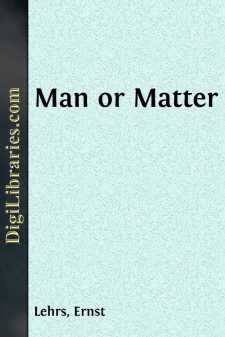Categories
- Antiques & Collectibles 13
- Architecture 36
- Art 48
- Bibles 22
- Biography & Autobiography 813
- Body, Mind & Spirit 142
- Business & Economics 28
- Children's Books 14
- Children's Fiction 11
- Computers 4
- Cooking 94
- Crafts & Hobbies 4
- Drama 346
- Education 46
- Family & Relationships 57
- Fiction 11829
- Games 19
- Gardening 17
- Health & Fitness 34
- History 1377
- House & Home 1
- Humor 147
- Juvenile Fiction 1873
- Juvenile Nonfiction 202
- Language Arts & Disciplines 88
- Law 16
- Literary Collections 686
- Literary Criticism 179
- Mathematics 13
- Medical 41
- Music 40
- Nature 179
- Non-Classifiable 1768
- Performing Arts 7
- Periodicals 1453
- Philosophy 64
- Photography 2
- Poetry 896
- Political Science 203
- Psychology 42
- Reference 154
- Religion 513
- Science 126
- Self-Help 84
- Social Science 81
- Sports & Recreation 34
- Study Aids 3
- Technology & Engineering 59
- Transportation 23
- Travel 463
- True Crime 29
Man or Matter
by: Ernst Lehrs
Description:
Excerpt
CHAPTER I
Introductory
If I introduce this book by relating how I came to encounter Rudolf Steiner and his work, more than twenty-five years ago, and what decided me not only to make his way of knowledge my own, but also to enter professionally into an activity inspired by his teachings, it is because in this way I can most directly give the reader an impression of the kind of spirit out of which I have written. I am sure, too, that although what I have to say in this chapter is personal in content, it is characteristic of many in our time.
When I first made acquaintance with Rudolf Steiner and his work, I was finishing my academic training as an electrical engineer. At the end of the 1914-18 war my first thought had been to take up my studies from where I had let them drop, four years earlier. The war seemed to imply nothing more than a passing interruption of them. This, at any rate, was the opinion of my former teachers; the war had made no difference whatever to their ideas, whether on the subject-matter of their teaching or on its educational purpose. I myself, however, soon began to feel differently. It became obvious to me that my relationship to my subject, and therefore to those teaching it, had completely changed. What I had experienced through the war had awakened in me a question of which I had previously been unaware; now I felt obliged to put it to everything I came across.
As a child of my age I had grown up in the conviction that it was within the scope of man to shape his life according to the laws of reason within him; his progress, in the sense in which I then understood it, seemed assured by his increasing ability to determine his own outer conditions with the help of science. Indeed, it was the wish to take an active part in this progress that had led me to choose my profession. Now, however, the war stood there as a gigantic social deed which I could in no way regard as reasonably justified. How, in an age when the logic of science was supreme, was it possible that a great part of mankind, including just those peoples to whom science had owed its origin and never-ceasing expansion, could act in so completely unscientific a way? Where lay the causes of the contradiction thus revealed between human thinking and human doing?
Pursued by these questions, I decided after a while to give my studies a new turn. The kind of training then provided in Germany at the so-called Technische Hochschulen was designed essentially to give students a close practical acquaintance with all sorts of technical appliances; it included only as much theory as was wanted for understanding the mathematical calculations arising in technical practice. It now seemed to me necessary to pay more attention to theoretical considerations, so as to gain a more exact knowledge of the sources from which science drew its conception of nature. Accordingly I left the Hochschule for a course in mathematics and physics at a university, though without abandoning my original idea of preparing for a career in the field of electrical engineering....


